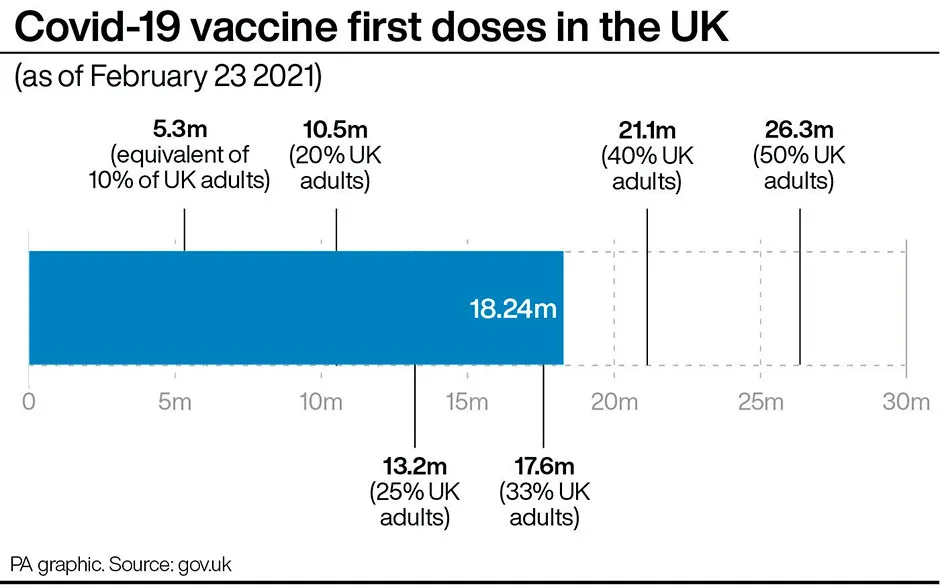A single jab of the Pfizer vaccine gives a four-fold reduction in the number of asymptomatic coronavirus infections, a new study has indicated.
The new data, from Addenbrooke’s Hospital in Cambridge, suggests the “dramatic reduction” in positive tests among asymptomatic healthcare workers who had received one dose of the coronavirus vaccine can make “hospitals even safer places to be”.
The study, which is awaiting peer review, analysed results from thousands of COVID-19 tests carried out weekly on hospital staff displaying no coronavirus symptoms.It was led by a team at Cambridge University Hospitals NHS Foundation Trust (CUH) and the University of Cambridge.
The researchers tested vaccinated and unvaccinated staff over the two-week period between 18 and 31 January, and split the results into three categories: unvaccinated staff; staff who had been vaccinated under 12 days prior; and staff who had been vaccinated over 12 days before the test.
Read more about the Pfizer vaccine:
- Pfizer vaccine: Single dose ‘90 per cent effective after 21 days'
- Pfizer vaccine appears to be effective against UK coronavirus variant
Results showed that 26 out of 3,252 (0.80 per cent) tests from unvaccinated healthcare workers were positive. This compared to 13 out of 3,535 (0.37 per cent) tests from healthcare workers who had their vaccines under 12 days beforehand and four out of 1,989 (0.20 per cent) tests from staff at 12 days or more post-vaccination, the university said.
This suggests a that the healthcare workers who were vaccinated more than 12 days prior had 75 per cent protection against asymptomatic COVID-19, and had a four-fold reduction in cases. For those who had been vaccinated fewer than 12 days, the level of asymptomatic infection was halved.
The researchers released the figures ahead of peer review because of “the urgent need to share information relating to the pandemic”.

“Our findings show a dramatic reduction in the rate of positive screening tests among asymptomatic healthcare workers after a single dose of the Pfizer/BioNTech vaccine," said Dr Nick Jones, first author on the study and an infectious diseases expert.
“This is fantastic news for both hospital staff and patients, who can be reassured that the current mass vaccination strategy is protecting against asymptomatic carriage of the virus in addition to symptomatic disease, thereby making hospitals even safer places to be.”
On 22 February, real world data from Public Health England (PHE) showed that a single shot of the Pfizer vaccine cuts the chance of hospital admission and death from COVID-19 by more than 75 per cent among the over-80s.
How do scientists develop vaccines for new viruses?
Vaccines work by fooling our bodies into thinking that we’ve been infected by a virus. Our body mounts an immune response, and builds a memory of that virus which will enable us to fight it in the future.
Viruses and the immune system interact in complex ways, so there are many different approaches to developing an effective vaccine. The two most common types are inactivated vaccines (which use harmless viruses that have been ‘killed’, but which still activate the immune system), and attenuated vaccines (which use live viruses that have been modified so that they trigger an immune response without causing us harm).
A more recent development is recombinant vaccines, which involve genetically engineering a less harmful virus so that it includes a small part of the target virus. Our body launches an immune response to the carrier virus, but also to the target virus.
Over the past few years, this approach has been used to develop a vaccine (called rVSV-ZEBOV) against the Ebola virus. It consists of a vesicular stomatitis animal virus (which causes flu-like symptoms in humans), engineered to have an outer protein of the Zaire strain of Ebola.
Vaccines go through a huge amount of testing to check that they are safe and effective, whether there are any side effects, and what dosage levels are suitable. It usually takes years before a vaccine is commercially available.
Sometimes this is too long, and the new Ebola vaccine is being administered under ‘compassionate use’ terms: it has yet to complete all its formal testing and paperwork, but has been shown to be safe and effective. Something similar may be possible if one of the many groups around the world working on a vaccine for the new strain of coronavirus (SARS-CoV-2) is successful.
Read more:
